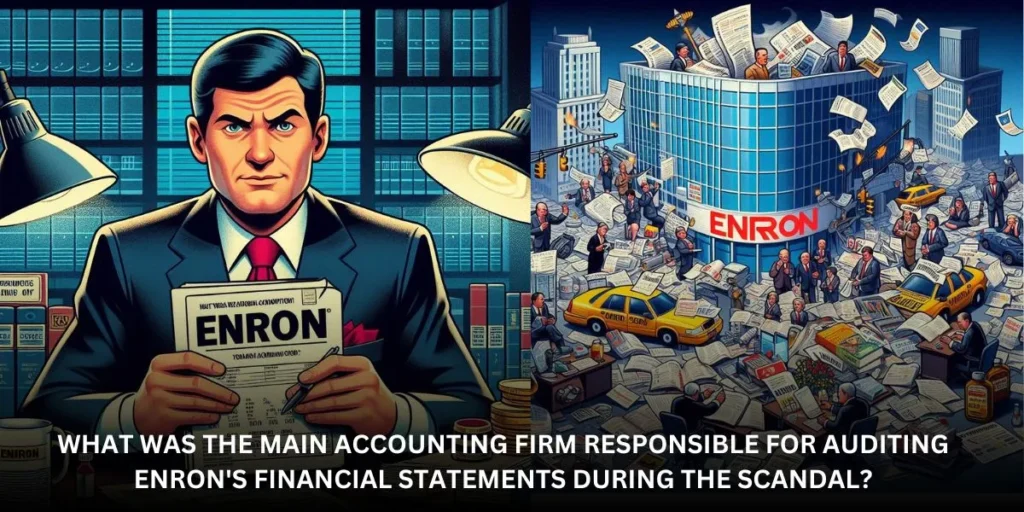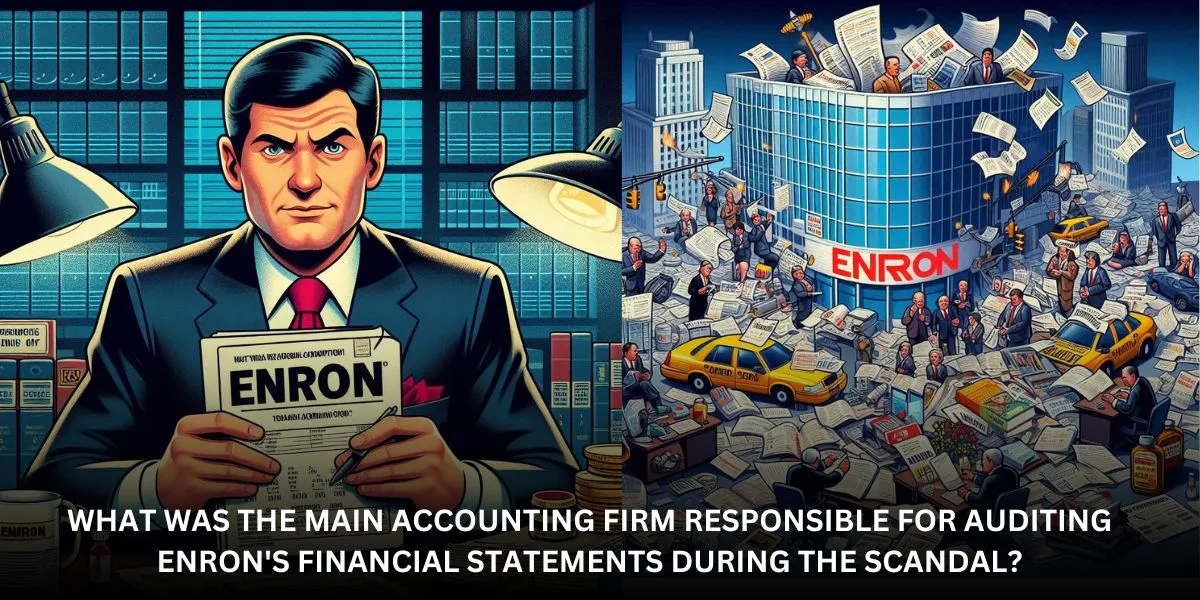What Was the Main Accounting Firm Responsible for Auditing Enron’s Financial Statements During the Scandal? One of the most notorious business disasters in history, the Enron crisis was characterized by greed, dishonesty, and a monumental failure in corporate governance. An accounting firm that was once a titan in its industry was at the center of this affair. However, during the affair, which major accounting firm was in charge of auditing Enron’s financial statements? Arthur Andersen is the solution. The rise and fall of Arthur Andersen is examined in this piece, along with its significance in the Enron scandal and wider ramifications for the auditing sector.

1. The Rise of Arthur Andersen
After being founded in 1913, Arthur Andersen expanded rapidly to rank among the “Big Five” accounting companies, which also included PricewaterhouseCoopers, Deloitte, Ernst & Young, and KPMG. Arthur Andersen established itself as a trustworthy and moral company, and it was well-known for its honesty and high standards. But Andersen’s goals changed as the competition grew fiercer and the demand to produce higher revenues increased..
2. Enron: The Energy Giant
Since its founding in 1985, Enron has grown quickly to be among the top energy corporations in the world. Enron entered a number of industries under the direction of CEOs Kenneth Lay and Jeffrey Skilling, including natural gas, electricity, and even broadband services. However, Enron’s intricate and inventive corporate plan concealed serious financial problems.
3. The Enron-Arthur Andersen Relationship
Since Enron’s founding, Arthur Andersen has been the company’s auditor. The two entities grew close as a result of their long-standing friendship. Conflicts of interest resulted from their proximity, nevertheless. Andersen blurred the boundaries between auditor and client by offering advisory services in addition to auditing Enron’s finances.
4. Unveiling the Scandal
When it became clear that Enron had been hiding billions of dollars in debt through special purpose companies, accounting tricks, and subpar financial reporting, the Enron controversy broke out in late 2001. Following a sharp decline in its stock price, Enron filed for bankruptcy in December 2001, becoming the largest bankruptcy in US history at the time.
5. The Role of Arthur Andersen
A major part of the scandal was played by Arthur Andersen. Even though the company was aware that Enron’s financial statements were false, it nevertheless accepted them. Later, internal records revealed that Andersen auditors knew about the anomalies but did nothing about them. Rather, they frequently supported Enron’s dishonest business practices, putting customer retention ahead of moral auditing principles.
6. Fraud and Obstruction of Justice
Following the crisis, Arthur Andersen was accused of hindering justice by destroying important records pertaining to Enron’s audits. This was perceived as an attempt to hide their involvement in the scam. The firm’s license to audit public corporations was revoked in 2002 after it was found guilty.
7. The Fallout for Arthur Andersen
Devastating effects resulted after Arthur Andersen’s guilty verdict. The company, which was once a major force in the accounting industry, was essentially destroyed. Thousands of workers lost their jobs, and the company’s reputation was permanently damaged. The case brought to light the serious consequences that can arise from unethical behavior in the accounting industry.
8. Lessons Learned
The Enron crisis and Arthur Andersen’s demise serve as sobering reminders of the need of moral principles in corporate governance and accounting. It is crucial that auditors remain impartial and independent. The controversy also brought to light the risks associated with conflicts of interest and the disastrous outcomes that might result from ignoring them.
9. Impact on the Accounting Industry
The accounting industry was rocked by the Enron crisis. There was a serious loss of trust in financial reporting and audits. The public, authorities, and investors started to doubt the accuracy of audited financial accounts. The controversy also forced a global review of the ethics and procedures followed by accounting companies.
10. Reforms and Regulations / what was the main accounting firm responsible for auditing enron’s financial statements during the scandal?
Significant changes were made in response to the Enron scandal in order to reestablish public trust in financial reporting. A significant piece of legislation, the Sarbanes-Oxley Act of 2002, was designed to increase corporate responsibility and governance. Stricter rules for auditors, improved financial reporting, and increased protection for whistleblowers were among the main measures.
11. Current State of Corporate Auditing
The Enron scandal’s legacy is still felt in the corporate auditing industry today. Businesses are keeping a closer eye on upholding moral principles, and regulatory monitoring has expanded. But there are still difficulties. Due to the intricacy of contemporary corporate dealings and the dynamic character of financial markets, auditors must constantly adapt and exercise caution.
12. Conclusion
The Enron crisis and the collapse of Arthur Andersen serve as sobering reminders of the vital role that ethics and integrity play in the accounting industry. Even though Arthur Andersen’s name will always be associated with one of the worst corporate frauds in history, significant reforms aimed at averting such incidents in the future have been brought about by the lessons learnt from this affair. Auditors can contribute to ensuring the transparency and dependability of financial reporting, which is crucial for the confidence and stability of the financial markets, by enforcing strict standards and being independent.
FAQ
1. Which primary accounting firm oversaw the financial statement audit of Enron throughout the scandal?
During the affair, the primary accounting firm in charge of auditing Enron’s financial accounts was Arthur Andersen.
2. What caused the collapse of Enron as a result of Arthur Andersen’s role in the scandal?
Because the firm was found guilty of obstructing justice by burning papers connected to Enron’s audits, which damaged its reputation and resulted in the loss of its license to audit public companies, Arthur Andersen’s role in the Enron crisis ultimately contributed to its downfall.
3. Which major financial techniques did Enron employ to conceal its debts?
Enron concealed billions of dollars in debt by using special purpose companies, accounting loopholes, and subpar financial reporting, giving the impression that the corporation was more financially solid than it actually was.
4. In what ways did the Enron scandal expose problems that the Sarbanes-Oxley Act of 2002 addressed?
In order to improve corporate governance and accountability, the Sarbanes-Oxley Act of 2002 implemented stronger standards for auditors, improved financial disclosures, and increased protection for whistleblowers. These reforms were in response to issues brought to light by the Enron scandal.
5. In light of the Enron incident and the demise of Arthur Andersen, how is the accounting sector currently doing?
Since the Enron affair and the demise of Arthur Andersen, the accounting business has experienced heightened governmental supervision and a greater emphasis on ethical standards. Businesses are more watchful about upholding their objectivity and independence, but they still face difficulties keeping up with the intricacy of today’s financial operations.

